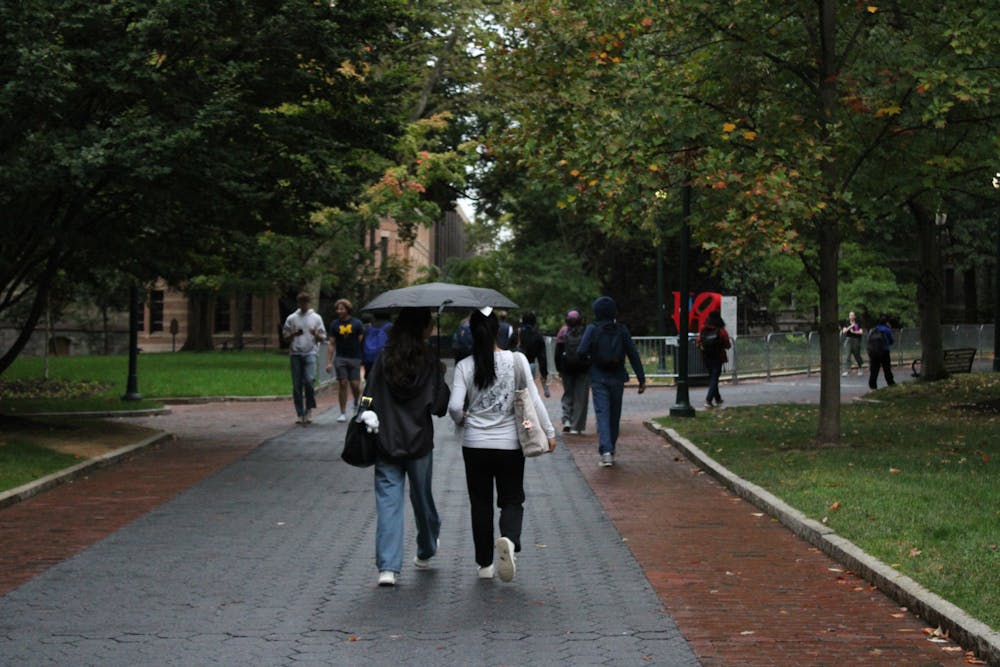
There is a particular ethos at Penn that appeals to people as individuals: that there is no greater good than your happiness and that you don’t have to be devoted or subservient to anything else. What actually happens, though, is we hyperfixate on what prevents us from achieving that “clear horizon” — what Alfred Hitchcock described as happiness. The paradox is that the more we list and resent the things that prevent us from being happy, the more we live in that anger and frustration and the more we stay unhappy.
It was brought to my attention recently that whenever someone has asked about my day, my classes, or myself, I say something like “long,” or “It was alright.” To be clear, I’m not saying that we need to think more positively. Instead, the issue is the rewards we get for talking about our problems more than we do for anything else. When we talk to other people, we are often more interested in the things that make them unhappy than the things that make them happy. We have become socially conditioned to say something like “long” “alright” or “okay” rather than to share something positive.
The act of verbalizing an emotion is a cathartic experience for us, which helps put our emotions into perspective. As Shakespeare understood when writing “Macbeth”: “Give sorrow words. The grief that does not speak whispers the o'erfraught heart and bids it break.”
But rumination is different. Derived from the Latin word for chewing cud, the word “ruminate” describes the process in which cows regurgitate and rechew their food. It also describes the very human act of mulling over memories that tend to be negative. According to the American Psychological Association, ruminators exhibit personality traits such as “perfectionism, neuroticism and excessive relational focus.” Yale psychologist Susan Nolen-Hoeksema describes it as “a tendency to so overvalue your relationships with others that you will sacrifice yourself to maintain them, no matter what the costs.”
Thinking about your problems and talking about your problems all the time makes them grow. The question becomes where you draw the line between a healthy conversation about negative emotions and unhealthy, repetitive rumination.
At Penn, we are focused on personal fulfillment. In the shadow of the Wharton School, this is objectively a good and productive obsession that has allowed Penn to thrive as an institution. But if our deep conversations occur only when we talk about our problems, insecurities, or struggles, then they obscure the depth of our characters like mud does water. The streak of individualism that runs through campus extols the virtues of being grown-up, responsible, and a hard worker. But there's also the sense of doing what we want, gratifying our appetites, and exploring all the parts of us that are self-centered and carefree.
We feel more comfortable describing the ways in which our desires are impeded rather than the things that fulfill us. Perhaps we are afraid of sounding too bubbly or exuberant, making us sound less real. Maybe the fear is that talking about good things sounds prideful or arrogant. There is a certain idea on campus that associates “deep” things with sad things. It doesn’t need to be this way.
The next time you ask a friend how they are really doing, remember that often too much language is a sign of something absent. In a world where you can talk about anything, try to talk about good things, too: things like lying in the sunshine, or seeing a friend after a very long time, or swimming in a pond in the rain. When we talk about ourselves, we can’t worry about how others perceive us. We should sound like our true selves, not a version or impression of ourselves. Repressing our thoughts to say something conventional won’t achieve authenticity. And anyway, nothing we do for the sake of appearances is worth it.
WILL KELLY is a College junior studying English from Rochester, N.Y. His email address is willkell@sas.upenn.edu.
The Daily Pennsylvanian is an independent, student-run newspaper. Please consider making a donation to support the coverage that shapes the University. Your generosity ensures a future of strong journalism at Penn.
Donate




